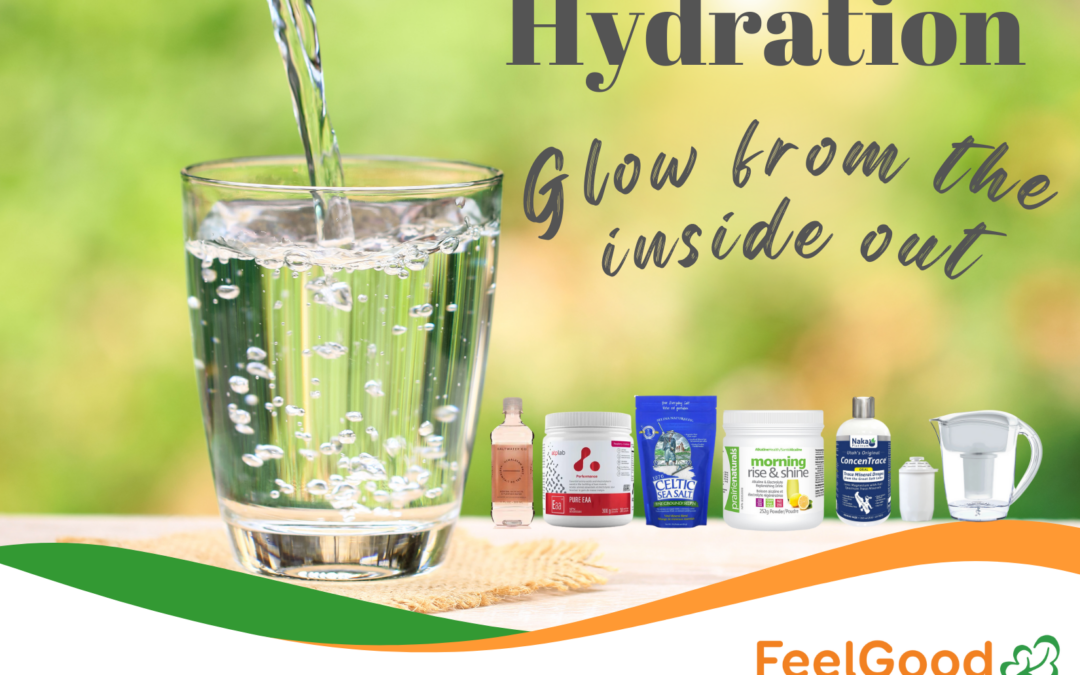“If there is magic on this planet, it is contained in water.” — Loren Eiseley
Consider this your friendly reminder to have fun in the sun this summer, but be sure to keep yourself hydrated! Hydration is likely more important than you think. It contributes to our mental health, immune health, injury prevention, and more. The primary component of all bodily fluids including blood (81%), lymph (96%), digestive juices (99%), urine (95%), tears (98%), and sweat (99%) is water. The brain and heart are made up of about 73% water, while the lungs are about 83% water. On average, the adult body is 60% water! We lose water daily through our skin, urine, bowels and lungs. About half of these losses may be replaced by the water content of our food. The other half must be acquired by specific fluid intake, primarily from drinking clean, filtered water. Foods with higher water content, such as fruits and vegetables require us to consume less drinking water than foods like meats and fats that are more concentrated and use more water in order for our bodies to utilize them.
Is a fresh cup of caffeinated coffee or tea your morning go-to? You may want to reconsider and shift this ritual to later in the morning. Caffeine blocks adenosine receptors as a result of structural similarities. Once bound to these receptors, caffeine provides us with the familiar feelings of alertness, energy and stimulation however, the adenosine system does not become active until approximately 90 minutes post-waking. Following what is hopefully a good night’s sleep, our bodies are most in need of hydration. Starting our day with a glass of clean filtered water is a good start, but we can give it a boost and support our adrenals by adding in electrolytes. Electrolytes are minerals in your blood and other body fluids that carry an electric charge. Electrolytes are important because they help to balance the amount of water in the body, balance acid/base pH level, move vitamins, minerals, antioxidants and oxygen into cells, move wastes out of cells, help to regulate blood pressure/heart rate/rhythm, and support muscle and nerve function.
So how much water should you aim to consume each day? The common suggestion of eight 8 oz. servings of water/day is easy to remember, however there are a number of factors that may impact your unique needs. These include variations in:
- the weather/climate conditions
- your activity level
- certain health conditions (such as diabetes or heart disease)
- body size
- any current illness
- pregnancy and breastfeeding
Plasma osmolality, urine osmolality, and urine specific gravity are the most common laboratory measures of hydration levels, but urine colour and smell are often used on a daily basis when a quick estimate is necessary. Darker yellow and/or strong smelling urine are a sign of dehydration. Thirst can be an indicator of hydration level, but it may not be the best. In addition to the urinary observations, other signs of dehydration to watch for include dry mouth, dizziness or confusion, lack of sweat or no sweat, and headaches.
Do you find the idea of reaching your daily water intake tedious or boring? Here are several fun and tasty options to try:
- Add your favourite fresh or frozen produce and fresh herbs (we like berries, citrus, cucumbers, mint and/or basil) along with Celtic Sea Salt Fine Ground for added electrolytes and minerals.
- ATP LAB Pure EAA Raspberry for pre-workout hydration and essential amino acids for athletic support.
- Kickstart hydration and support your adrenals with electrolytes while balancing body pH with Prairie Naturals Morning Rise & Shine
- Santevia Alkaline Pitcher with an easy pour this pitcher adds calcium, magnesium, potassium and other trace minerals while making water alkaline to help your body maintain optimal pH. Santevia Pitcher Filters also available.
- Save yourself a step with Saltwater Co Himalayan Salt Infused Water balanced combination of water and pink himalayan salt.
The content in this post is for information purposes only and is not intended for self-diagnosis or self-treatment of conditions that your health care practitioner should assess. The products discussed may not be suitable for you. Always read and follow the label.
For additional hydration recommendations, you are always welcome to visit us in-store at 317 Brock Street S Whitby, ON L1N 4K3.
At FeelGood Natural Health, we deeply appreciate the ongoing support of our customers (returning and new) over the past 26 years. Like all small businesses, it is our customers that have allowed us to operate as long as we have and to continue doing our best to meet your natural health needs. Our entire team wishes you a safe, happy, and healthy summer season.
References:
Alive Editorial 2017. “Hydration: Myths and Facts”. <https://www.alive.com/health/hydration-myths-and-facts/>
Haas, E. & Levin, B. (2006). Staying Healthy with Nutrition The Complete Guide to Diet and Nutritional Medicine. New York. Celestial Arts.

